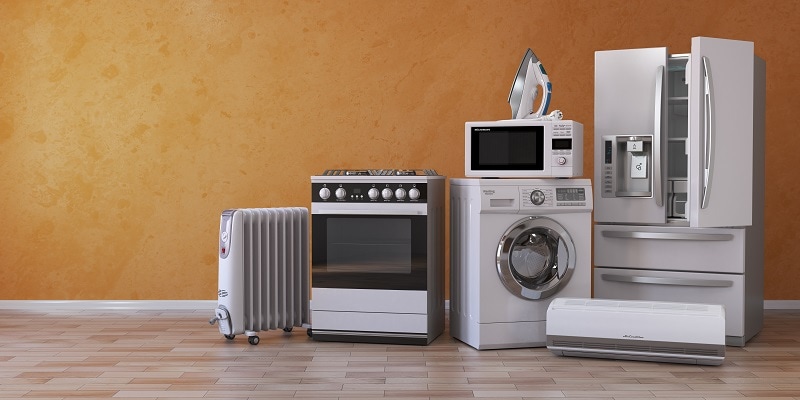Dedicated circuits provide power to an appliance through a single, dedicated circuit. Appliances that require dedicated circuits have higher voltage requirements than can be safely supplied by a standard 120-volt household receptacle, so a dedicated 220-volt receptacle needs to be installed. Dedicated circuits are necessary to prevent dangerous overloads that could cause wiring to overheat and circuit to trip repeatedly, which could result in an electrical fire.
The National Electrical Code calls for most major appliances to have dedicated circuits. Here are some typical cases where dedicated circuits are installed.
Each major appliance needs its own breaker
An electrical circuit is simply a path through which your home’s electrical supply flows. Your electrical panel contains several circuits, each one containing a circuit breaker that stops the flow of electricity if there is a dangerous power spike or if an appliance or outlet tries to draw too much current. While appliances with higher power demands than average appliances and electronics should have their own dedicated circuit and breaker, there are other instances in which appliances with lower power ratings should also be put on a separate circuit. Here is a look at some appliances and electronics that require individual circuit breakers, and how to have dedicated circuits installed using a residential electrician.
Power-Hungry Appliances
Most of the appliances that require their own circuit and circuit breaker are those that draw more power than average appliances and electrical devices. Common examples of power-hungry appliances include electrical ranges, wall ovens, refrigerators, heating and air conditioning units, furnaces, water heaters, washing machines, and dryers. Ask your Mikulka electrician for a complete list of appliances that require dedicated circuits per the National Electric Code.
Expensive Electronics
When several appliances and electrical devices are on the same circuit, they all share the same electrical supply. While this is not a problem for small electricity users such as lamps and fans, expensive appliances and/or electronics might be more sensitive to power fluctuations that can occur on a shared circuit. To protect your computers, flat screen televisions, and other expensive electrical devices, have them put on a dedicated circuit.
Must-Work Devices
There are some electrical devices that need to work in order to protect your home and keep your family safe. Sump pumps, for example, should be put on a dedicated circuit to ensure that they don’t stop working because of a blown fuse as the result of a power surge. It is also a good idea to put your garage door opener on a dedicated circuit, seeing as your garage door weighs hundreds of pounds and a fault in the electrical supply to the opener can send all of that weight crashing down.
Kitchen Appliances
Kitchen appliances often contains heating elements and large motors that draw a lot of electrical current. Ranges, wall ovens, some garbage disposals, dishwashers and freezers require dedicated circuits. Most refrigerators will require a dedicated circuit.
Microwave ovens often demand dedicated circuits, but it will depend on the wattage of the unit and whether the microwave is built-in or a stand-alone countertop design. The National Electrical Code requires one for fixed equipment, so a circuit must be set aside for any built-in oven or microwave. Small countertop models typically use less power than full-size units. Consequently, they’re less likely to need their own circuit.
Washer and Dryer
Washers and dryers have powerful motors heating elements, making a dedicated circuit necessary to prevent overloading the electrical system. Generally, any equipment that runs on 220-volt power will need its own circuit.
Heating and Air Conditioning
Heat pumps, furnaces and air conditioners are among the most energy-intensive appliances in the home and will need to each have a dedicated circuit. Electric baseboard heating is also going to require a dedicated circuit. All ductless mini-splits and some window air conditioners will also require a dedicated circuit.
Other Appliances
Many compact appliances do not need dedicated circuits. Examples include box fans, ceiling fans, slow cookers, food processors and sewing machines. Such units produce limited amounts of heat and don’t have particularly large motors. On the other hand, certain small appliances can easily overload circuits in combination with other devices. Toasters, toaster ovens, coffee makers, hot plates and blenders are capable of doing so.
The need for a separate circuit differs depending on the electrical system and appliances in a specific home. It’s important to follow all federal, state and local laws when upgrading electrical wiring.
Contact us
Have questions about dedicated circuits? Give us a call. The licensed electricians at Mikulka Electric can help determine what equipment in your home needs a dedicated circuit. Mikulka Electricians are always professional and efficient. Insured and trained to do the job right the first time. Experts in the field of electrics with over 25 years’ experience. Prepared with up-front pricing and a lifetime guarantee. We observe all personal protective equipment and COVID 19 requirements to keep our staff and your family safe. Our team of experts will respond immediately to your call for help. Call Mikulka Electric, Inc. for a wide range of electrical services, including indoor and outdoor lighting, electrical heating, electrical repairs, and back-up generators. We service the Central New Jersey area. Address 275 RT. 79 Morganville, NJ 07751 https://mikulka-electric.com/contact-us/
Phone 855-645-8552 or 855-MIKULKA

